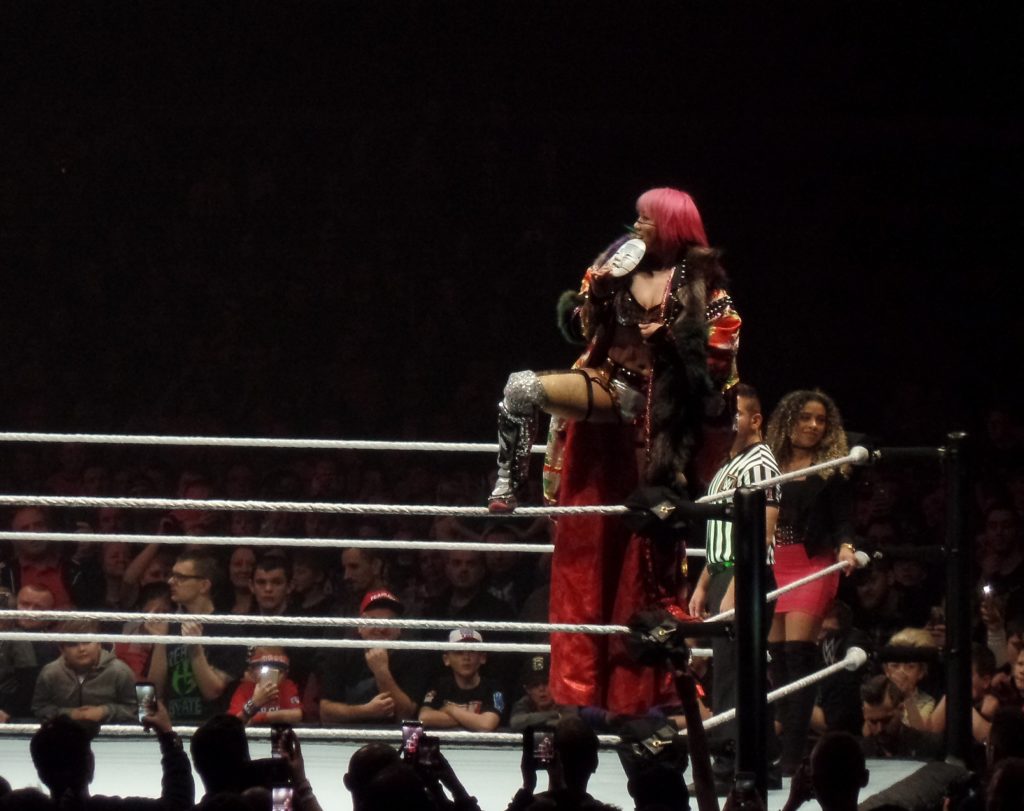
I recently came across an issue of The Popular Culture Studies Journal in 2018 that had a special section dedicated to professional wrestling studies. It has 16 whopping texts about the topic and I’ve only scratched the surface so far, but I already want to get started writing down some of my thoughts.
Pro wrestling is something that I’ve been watching on and off for over ten years now. (“On and off” means that there were some years in between when I barely watched anything, and periods when I watched wrestling shows every week.) I’ve been well aware of how it’s perceived as a culturally “inferior” form of entertainment, lowbrow, something that an academic person like myself ought to never be caught watching and enjoying. (I’m of course joking here.) But as I’ve watched it, I’ve found it a fascinating phenomenon in many ways, and even if right now it seems unlikely I’ll ever study it, well, in an alternative timeline I already would have. Back in the day when I was deciding the topic for my MA thesis, one of my options was to study how pro wrestling commentary on WWE’s shows is translated into Finnish, since (heavily edited) RAW and SmackDown had been aired on Finnish tv for a while at that point. And yes, some of the translations were ..interesting. My interest in Japanese culture ended up beating WWE for my MA thesis topic, but things could have easily turned out differently.
It is also a little hilarious that I’m continuously interested in research topics that are or have been considered lowbrow – digital games, the gothic, let’s play videos, carnival, and here pro wrestling… Not sure it’s a blessing or a curse to identify interesting phenomena in topics that appear to need to be justified over and over again for others who struggle to see their value. This challenge is certainly recognized and addressed by the pro wrestling scholars in the issue. In the introduction, Castleberry, Reinhard, Foy & Olson summarise so well why pro wrestling is right now an interesting resource for observing sociocultural issues that I’ll make an exception and quote it:
“Fake news is kayfabe, online performativity is a work, and social media campaigns can be top-down manipulated or bottom-up inspirational. The genre of pro wrestling is more than a physical story form. It articulates class struggle and personifies the negotiation of power—sometimes fair but oftentimes stacked against the just, the virtuous, the universal underdog.” (pages 65-66)
In other words… The fictional storyworld ‘bubbles’ of pro wrestling don’t seem too different from groups that establish their own concepts of truth, or the questioning of truth in today’s society. Online performativity is everywhere in different forms, including gameplay streaming, vlogging and blogging, review videos, or self-help advice… And in these different types of content, people do things or take on roles that are specifically intended for the performance and not something they would otherwise do. Some popular phenomena are backed by powerful institutions, while others begin their success on a grassroot level (see, for example, environmentalist movements). Certain social groups are either perceived as, or hope to be perceived as, underdogs, and gain supporters who wish to combat the perceived unjust division of power. Basically, despite its fictional setting, the concepts and phenomena that take place in pro wrestling are not at all divorced from reality, especially now when anyone can become an online performer and create their own narrative that is simultaneously fictional and realistic.
One particularly fascinating concept is kayfabe, as discussed by Eero Laine in the paper “Professional Wrestling Scholarship: Legitimacy and Kayfabe”. Kayfabe is based on the assumption that everyday events are somehow directed by those in power in the backstage, resulting in a simultaneously cynical and optimistically speculative view of the world. In wrestling, it has to do with how writers and powerful figures like Vince McMahon make decisions of how wrestlers are portrayed and what kinds of stories they’re allowed to tell. But even outside the world of pro wrestling, it seems a very fruitful approach for analysing the performances and theatricality in politics, business, the media, and so on. It might be combined, for example, with critical discourse analysis, which is especially focused on relations of power, dominance and inequality. I’ve witnessed a kind of deeply cynical kayfabe element even in the way gamers talk about games, their development, and any kind of failure at addressing player concerns (for example, when games have glitches that aren’t immediately fixed by the game developer) – there is a kind of big bad making decisions behind the scenes. There’s something here worth exploring, I think.
